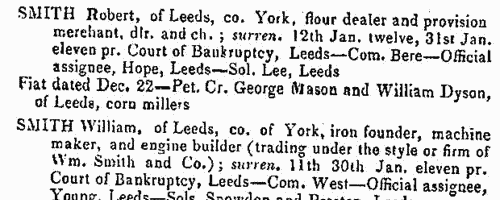 Masters of apprentices registered in Cambridge
(1770) Masters of apprentices registered in Cambridge
(1770)
Apprenticeship indentures and clerks' articles were subject to a 6d or 12d per pound stamp duty: the registers of the payments usually give the master's trade, address, and occupation, and the apprentice's name, as well as details of the date and length of the apprenticeship. There are central registers for collections of the stamp duty in London, as well as returns from collectors in the provinces. These collectors generally received duty just from their own county, but sometimes from further afield. The indentures themselves can date from a year or two earlier than this return. (The sample entry shown on this scan is taken from a Durham return. Each entry has two scans, the other being the facing page with the details of the indenture, length of service, and payment of duty.) IR 1/57HUNNYBUN. Cost: £8.00.  | Sample scan, click to enlarge

|
Deaths, Marriages, News and Promotions
(1807)
Death notices and obituaries, marriage and birth notices, civil and military promotions, clerical preferments and domestic occurrences, as reported in the Gentleman's Magazine. Mostly from England and Wales, but items from Ireland, Scotland and abroad.
HUNNYBUN. Cost: £4.00.  | Sample scan, click to enlarge

|
Dissolutions of Partnerships
(1826)
Trade partnerships dissolved, or the removal of one partner from a partnership of several traders
HUNNYBUN. Cost: £6.00.  | Sample scan, click to enlarge

|
Cambridgeshire Voters: Elsworth
(1832)
The poll on the election of three knights of the shire to serve in Parliament for the county of Cambridge, was taken at Cambridge, Royston, Newmarket, Ely, Wisbech and Whittlesea 18 and 19 December 1832. The candidates were Henry John Adeane esquire, Richard Greaves Townley esquire, Charles Philip Yorke esquire and John Walbanke Childers esquire. This poll book sets out the names of the voters in alphabetical order hundred by hundred and parish by parish. The voters' full names are stated, surname first. The right hand column records their votes. The new qualification for suffrage in the counties, after the passage of the 1832 Great Reform Bill, was the possession of a freehold estate worth 40s a year or more, a copyhold or long leasehold of £10 a year or more, or a tenancy or short leasehold of £50 a year or more.
HUNNYBUN. Cost: £6.00.  | Sample scan, click to enlarge

|
Insolvents
(1837)
Insolvency notices for England and Wales: insolvency often caused people to restart their lives elsewhere, so these are an important source for lost linksHUNNYBUN. Cost: £6.00.  | Sample scan, click to enlarge

|
Bankrupts
(1842)
Bankruptcy notices for England and Wales: bankruptcy often caused people to restart their lives elsewhere, so these are an important source for lost links
HUNNYBUN. Cost: £6.00.  | Sample scan, click to enlarge

|
Dividends of bankrupts' estates
(1842)
Dividends from moneys raised from bankrupts' estates in England and WalesHUNNYBUN. Cost: £6.00.  | Sample scan, click to enlarge

|
Bankruptcy Meetings
(1843)
Meetings about bankrupts' estates in England and WalesHUNNYBUN. Cost: £6.00.  | Sample scan, click to enlarge

|
Petitioning Creditors and Solicitors
(1843)
Principal creditors petitioning to force a bankruptcy (but often close relatives of the bankrupt helping to protect his assets): and solicitorsHUNNYBUN. Cost: £6.00.  | Sample scan, click to enlarge

|
Trustees and Solicitors
(1844)
Trustees appointed to take over bankrupts' estates in England and Wales, and their solicitors. Trustees are often friends or relatives of the bankrupt: and/or principal creditors
HUNNYBUN. Cost: £6.00.  | Sample scan, click to enlarge

|
Research your ancestry, family history, genealogy and one-name study by direct access to original records and archives indexed by surname.













